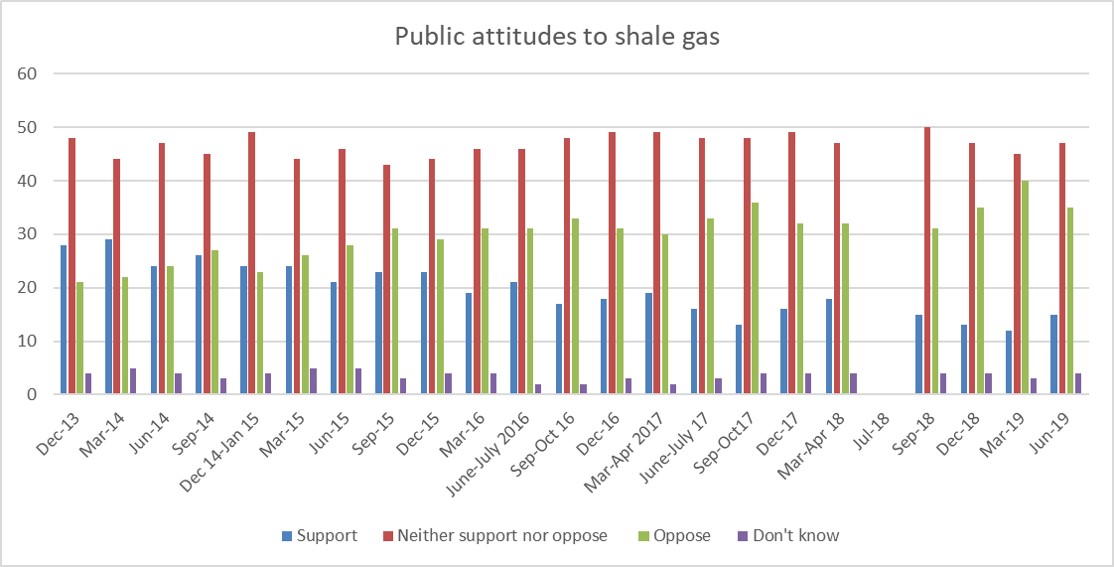
Source: Wave tracker survey for BEIS
Support for fracking has recovered from a record low in the spring, according to results from the latest government attitudes survey. Opposition has fallen from a previous record high.
The quarterly Wave tracker survey showed levels of support returned to 15%, last reached in September 2018. But the proportion of people who support fracking remains at less than half those who oppose. 47% neither support nor oppose.
The survey, for the Department of Business, Energy and Industrial Strategy (BEIS), was conducted in June 2019 when no fracking was being carried out in the UK. It was before Cuadrilla announced it was returning to frack at Preston New Road, near Blackpool, and before Aurora Energy Resources said it would be submitting plans to frack at Altcar Moss near Formby.
Support for fracking
Support for fracking rose to 15% from the record low of 12% in March 2019. Strong support for fracking remained unchanged at 2%.
Why do people support fracking?
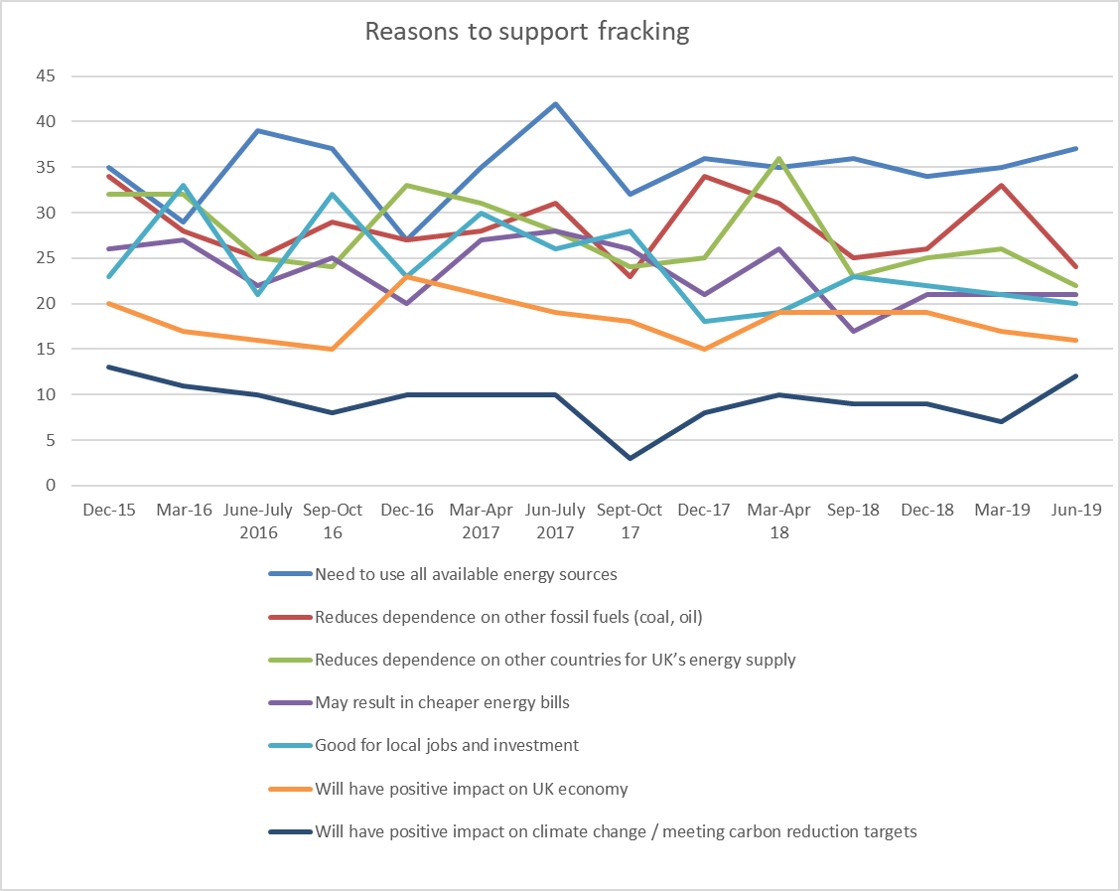
Source: Wave tracker survey for BEIS
Supporters of fracking interviewed for this survey appeared to be less influenced by industry arguments that UK shale gas would reduce dependence on other fossil fuels and energy from other countries. Both these reasons for support fell.
But the argument that fracking would have a positive impact on climate change appears to have had some traction. The proportion giving this reason for supporting fracking rose in the latest survey.
Key reasons
- Need to use all available energy sources 37% (up from 35%)
- Reduces dependence on other fossil fuels 24% (down from 33%)
- Reduces dependence on other countries for UK energy 22% (down from 26%)
- May result in cheaper energy bills 21 (unchanged on the previous two surveys)
- Positive impact on the UK economy 16% (down from 17%)
- Positive impact on climate change 12% (up from 7%)
Opposition
According to the latest results, 35% of participants opposed fracking, down from the record of 40% in March 2019. The level of opposition is now back to that reached in December 2018.
Strong opposition to fracking also fell. The latest figure was 12%, down from a record of 16% in March 2019, and back to the level of September 2018.
Who opposes fracking?
As in previous surveys, the results found that opposition was higher among people who knew more about fracking and lived where there were licences to explore for shale gas.
Among people who said they knew a lot or a little about fracking, 49% said they opposed it, compared with 18% who supported.
Opposition toward fracking was also higher among people:
- Living in Scotland (47%), south west England (44%), Yorkshire and the Humber (41%), and north west England (40%)
- In social grades AB (42%, compared with 27% of those in social grades DE)
Why do people oppose fracking?
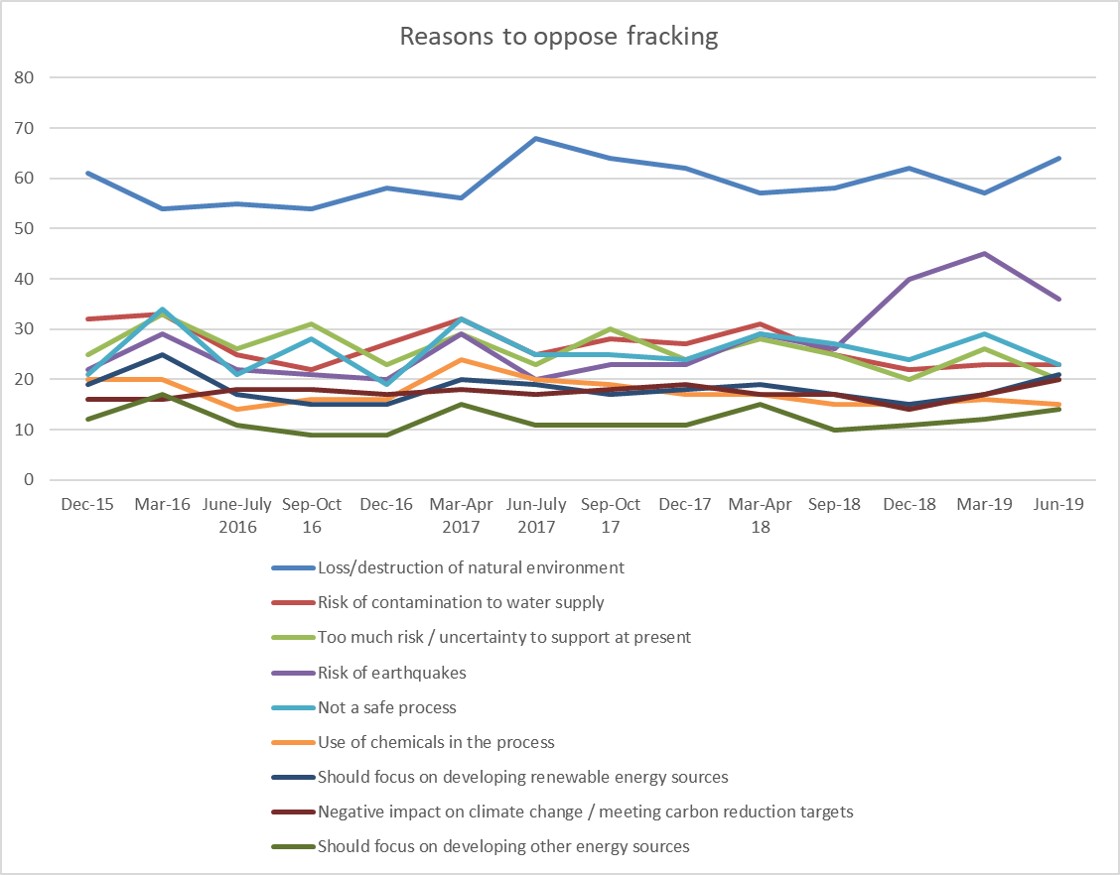
Source: Wave tracker survey for BEIS
The latest figures indicate less concern about the risk of earthquakes compared with the previous survey but more about the loss or destruction of the natural environment. There was also an increase in the proportion of people saying they opposed fracking for reasons about climate change and other sources of energy.
Key figures
- Loss or destruction of natural environment 64%, (up from 57%)
- Risk of contamination to water supply 23% (unchanged from previous survey)
- Too much risk/uncertainty 20% (down from 26%)
- Risk of earthquakes 36% (down from a previous record level of 45%)
- Not a safe process 23% (down from 29%)
- Use of chemicals 15% (down from 16%)
- Should focus on renewable energy 21% (up from 17%)
- Negative impact on climate change 20% (up from 17%)
Neither support nor oppose
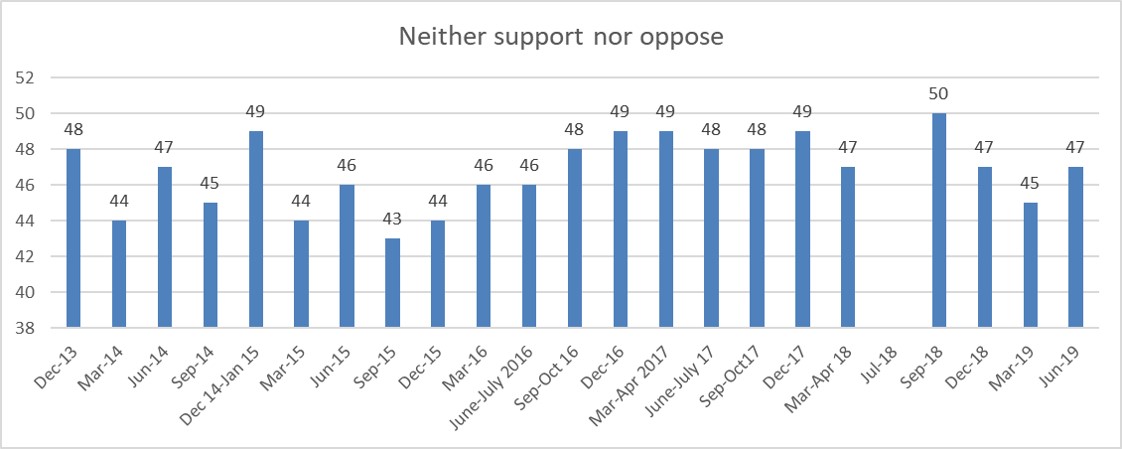
Source: Wave tracker survey for BEIS
47% of participants neither supported nor opposed fracking. This was 2 points up on the previous survey and back to levels last seen in December 2018.
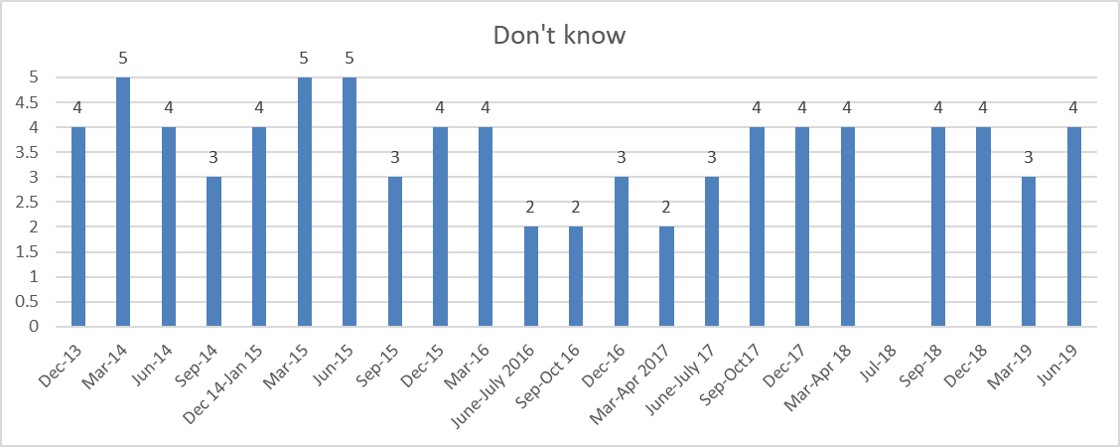
Source: Wave tracker survey for BEIS
4% said they did not know whether they supported or opposed, up 1 point on the previous survey.
Of the people who said they knew less about fracking, 77% neither supported nor opposed it. Among this group, support was 10% and opposition was 13%.
Awareness
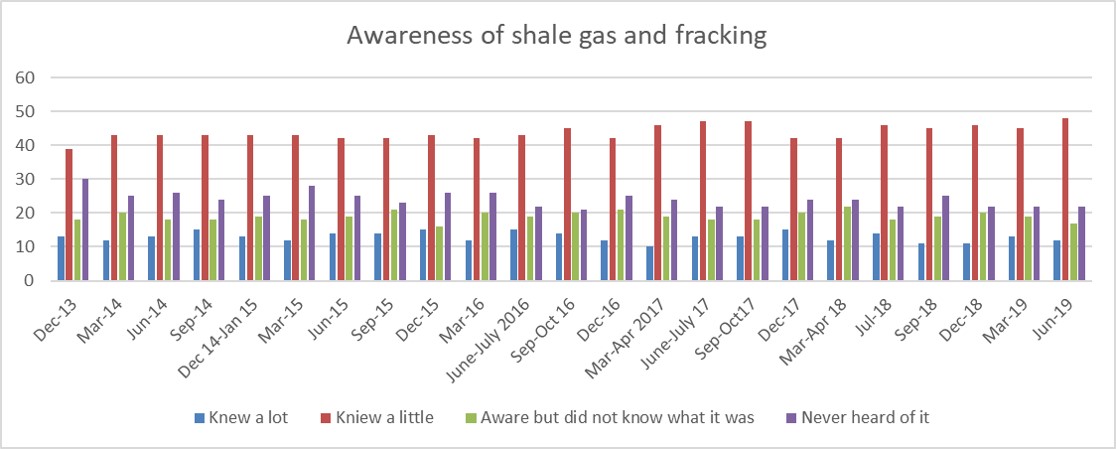
Source: Wave tracker survey for BEIS
78% of participants were aware of fracking for shale gas. This was unchanged on the previous two surveys.
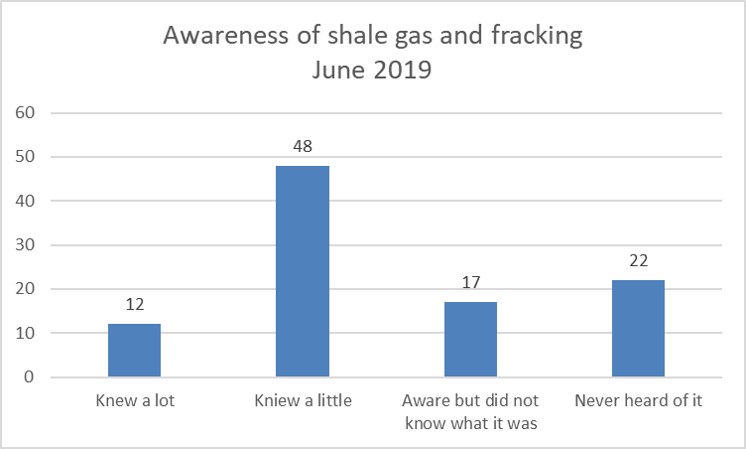
Source: Wave tracker survey for BEIS
12% said they knew a lot about fracking (down 1 point from the previous survey). 48% said they knew a little (up 3 points) and 17% were aware (down 2 points). 22% said they had never heard of fracking, unchanged on the previous two surveys.
BEIS said awareness of fracking was highest among:
- Men (82%, compared with 74% of women)
- People aged 65 and over (90%, compared with 61% of those aged 16 to 24)
- People in social grades AB (87%, compared with 65% of those in social grades DE)
- People with household incomes of £50,000 or more (87%, compared with 71% of those with household incomes under £16,000).
- People living in south west England (90%), north west England (88%) and Wales (87%) compared with east England (64%) and London (65%)
Methodology
Data for the survey, Wave 30, were collected from 5-16 June using face-to-face in-home interviews with a representative sample of 4,231 adults (aged 16 and over) in the UK. Interviews were carried out using the Kantar UK Omnibus, which uses a random location quota sampling method.
Categories: Research





Interesting.
Loads of revealing DATA there.
However, the key message IMHO, is that whilst the excitement may increase in certain groups that is not creating any change in the population as a whole. For all the attempts by vested interests to imply the population is easily convinced it obviously isn’t. That was my experience within Marketing and to forget that can be quite costly with regard to cost and credibility.
I quite agree Martin, great advice for the frackers.
Whoops I know how pedantic you can be…. Great advice for would be frackers.
Seriously what is wrong with today’s excuse for Humanity?
UK residents are either too greedy, too gullible or too greedy to see beyond tonight’s crap television broadcasting.
The Country is in social and political chaos antway and has been for some time, NHS, Zero Hour Contracts, deferred pensions, sabre rattling Continents away, etc., etc.
Now an increased number of citizens apparently are in favour of all the social ills that fracking will bring!
I suppose that they have been confused by all the Brexit nonsense and lost the will to live?
[Comment removed by moderator]
Peter
Not to worry. Most people are not bothered about fracking as it is not happening near them.
Just as they only get engaged in renewables when it looks as of it turns up next door.
Good that some who are not next to all of those issues are more knowledgable about it and have a view.
Plus some intelligent and knowledgable people who are next to it are for and some against.
It is what makes DOD so interesting.
Or, if you want to kill any conversation in 99% of pubs in the UK, talk about fracking..
Wrong, Wrong, Wrong & Wrong!!
peter your arguments are without substance! [Edited by moderator]
I think you have a point Peter, but not quite as you outline it.
The UK public have never been gullible and have had their fill of Project Fears in the last few years that have just demonstrated repeatedly there are many who want to treat them as useful idiots but they are not. The antis continuing along that path will arrive at the same place, especially whilst more emerges around arrests for things like allegedly assaulting emergency workers. Keep doing the same things in more extreme ways and the result is inevitable.
I was on zero hour contracts twice, Peter. We called it casual work then. Once as a student and once when made redundant. Absolutely great for me, and zero hours still showing a high degree of support in market research amongst the majority who work them. You again confuse what some do not like with what is the general picture.
Zero hour contracts – NOT the same as casual work – similar but now some are condemned to live this way.
NOT just when you are a student, Martin, or looking for something before you find a proper job. Zero hour contracts give no stability, no career structure, no-one caring for you as an employee, no employment rights, no maternity/paternity rights for example. Nothing that working people have fought to achieve for years
As for this survey, I agree with Peter – how shocking that most people don’t know or know very little about fracking. It is clear that when people do, the intelligent majority will oppose fracking
There are people who would love to keep us in ignorance. The mushroom growing theory – keep ’em in the dark and shovel shit over them
Well ve, if you want all that within employment there are plenty of jobs that offer that and you can make that choice, so no one is being condemned. The choice exists.However, there are many on zero hours, like students, who do not want that but do want flexible work. And there are many who do get some of the benefits you wrongly state they do not. However, the Unions miss out on capturing them. Tough, but that is a different issue.
Only 12% knew a lot about fracking but 35% opposed. If all of the 12% were anti, which they are not, even then for another 23% to oppose hardly makes them intelligent! Sheep do the same, but they are not intelligent. The intelligent tribe versus the unintelligent tribe nonsense is hardly going to change peoples opinions-and it is evidently not doing so.
Doctor Dave says a whole 15% again Wow, but perhaps you should think that those not against, being the majority, seem reluctant to go either way without knowing a lot about fracking, whilst the antis minority show that the bulk of them came to a conclusion without much knowledge of the subject! Trying to position under that data as the intelligent tribe is not supported by the data. I know it is inconvenient, but that is the case demonstrated.
vewright – the statement about “the intelligent majority will oppose fracking” is complete rubbish. I have a contact list of over 2000 geoscientists the majority of which have PhD’s. I only know two from that list who oppose fracking. It is quite clear that the people who know most about the subsurface are more pro-fracking
Could you please quantify how many of those 2000 geoscientists work in the fracking industry and are personally dependent on it for their daily bread ?
Sara – the thing that people like you miss is that fracking isn’t too good for the daily bread of geoscientists. Our knowledge isn’t needed to the same extent as it is with conventional reservoirs and the reduction in the oil and gas price caused by fracking as made it more difficult for us to get work. But to answer your question, I would have thought something like 1/4 are involved with fracking but that includes those who work on conventional reservoirs which are often fracked. I would have said something like 100 out of 2000 are in some way involved with shale gas
Thank you for that informative answer. I am keen to educate myself. Would you mind saying how many of your cohort are UK based and which branch of geoscience are they are specialists in thanks
There are an awful lot of people receiving benefits Sara. As they are personally dependent upon the Government of the day for their daily bread does that exclude them from being able to make their own decisions?
Interesting that people who have become informed about fracking tend toward opposing it.
Strange that, April. How have they become informed about the benefits UK fracking can provide? The data is not available as yet. So, what you really mean, is partially informed and they tend to oppose it. Now, that is certainly interesting. However, we will have to differ on whether that is a sign of intelligence.
A whole 15% again? Wow! :0)
Frack on, Frack on!!
According to these surveys the “majority” support Solar PV as the best renewable technology for the UK. Which tells us that the public have little or no knowledge of what is actually the best renewable technology.